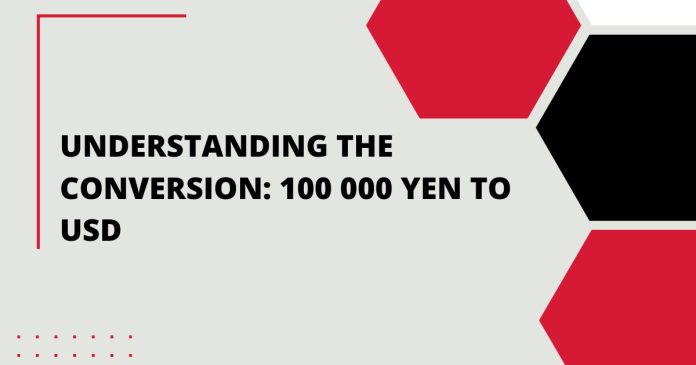Introduction
In today’s globalized world, currency exchange rates play a pivotal role in international trade, travel, and investments. One common exchange that many individuals encounter is converting Japanese yen (JPY) to US dollars (USD). In this article, we’ll delve into the conversion of 100 000 yen to USD, exploring the factors influencing exchange rates, the impact of exchange rate fluctuations, and practical tips for making the most of your currency conversions.
Factors Influencing Exchange Rates
Exchange rates are influenced by a myriad of factors that reflect the economic conditions of both countries involved. These factors include:
1. Economic Indicators
Economic indicators such as inflation rates, gross domestic product (GDP), and unemployment rates can significantly impact exchange rates. A stronger economy usually leads to a stronger currency.
2. Interest Rates
Differences in interest rates between two countries can influence the flow of capital and subsequently affect exchange rates. Higher interest rates tend to attract foreign investors, boosting the value of the local currency.
3. Political Stability
Political stability fosters confidence in a nation’s currency. Currencies of politically stable countries are more likely to be sought after by foreign investors.
4. Market Speculation
Traders and investors often engage in speculation based on economic data and geopolitical events. These actions can lead to short-term fluctuations in exchange rates.
Impact of Exchange Rate Fluctuations
The value of currencies is dynamic and subject to constant changes, which can have significant implications for various stakeholders:
1. Importers and Exporters
Businesses involved in international trade are directly affected by exchange rate fluctuations. A stronger yen compared to the US dollar can increase the cost of Japanese exports, potentially impacting competitiveness.
2. Travelers
Exchange rate fluctuations influence the purchasing power of travelers. A favorable exchange rate can make travel more affordable, while an unfavorable rate can lead to higher expenses.
3. Investors
Exchange rate movements can impact the returns on foreign investments. Fluctuations can lead to both opportunities and risks for investors in global markets.
Tips for Currency Conversion
When converting 100,000 yen to USD, consider these tips to maximize your value:
1. Choose the Right Time
Monitor exchange rates and select a time when the rate is favorable. Online currency converters and financial news sources can help with this.
2. Compare Conversion Options
Different platforms and institutions offer varying exchange rates and fees. Compare options to find the most cost-effective solution.
3. Be Mindful of Fees
Beware of hidden fees or unfavorable exchange rates at certain locations. It’s crucial to know the total cost of the conversion.
4. Consider Bulk Conversions
If you anticipate needing USD in the future, consider converting a larger sum to potentially benefit from more favorable rates.
Conclusion
Converting 100,000 yen to USD involves understanding the complex interplay of economic factors, political stability, and market dynamics. Exchange rates are fluid and can impact various aspects of our lives, from travel plans to international trade. By staying informed, comparing options, and being mindful of fees, individuals and businesses can navigate the world of currency conversion more effectively.
Frequently Asked Questions
Q1: Can I predict exchange rate movements accurately?
Exchange rates are influenced by numerous unpredictable factors, making accurate predictions challenging. However, analyzing economic indicators can provide insights into potential trends.
Q2: Should I convert all my yen at once?
Converting a larger sum might offer advantages if you anticipate future currency needs. However, consider the risk of locking in a specific rate.
Q3: How often do exchange rates change?
Exchange rates can change multiple times within a day due to market fluctuations and global events.
Q4: Are online currency converters reliable?
Online converters can provide real-time rates, but additional research is recommended to ensure accuracy and compare options.
Q5: What role does government policy play in exchange rates?
Government policies, such as monetary and fiscal measures, can impact exchange rates by influencing economic conditions and investor confidence.

